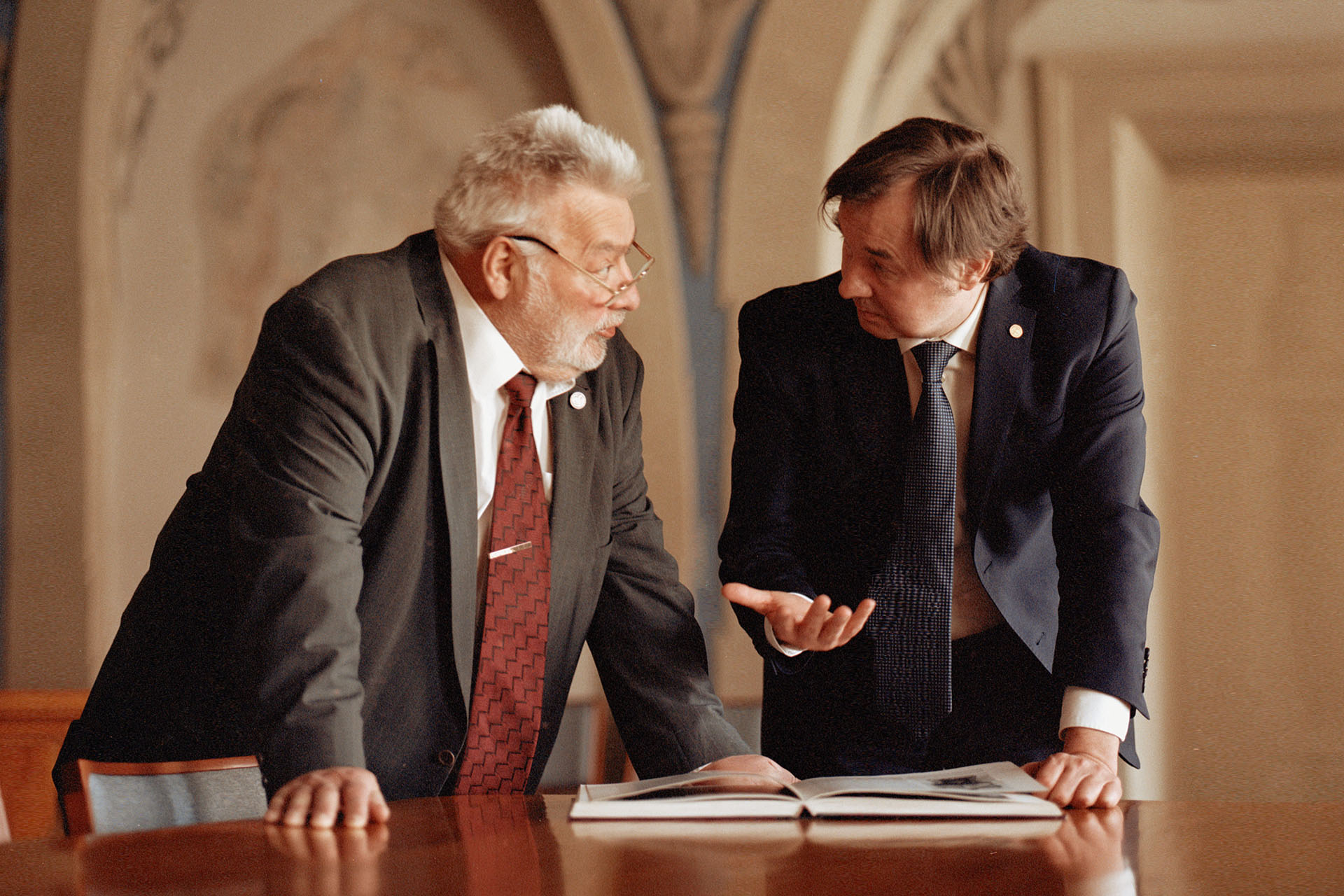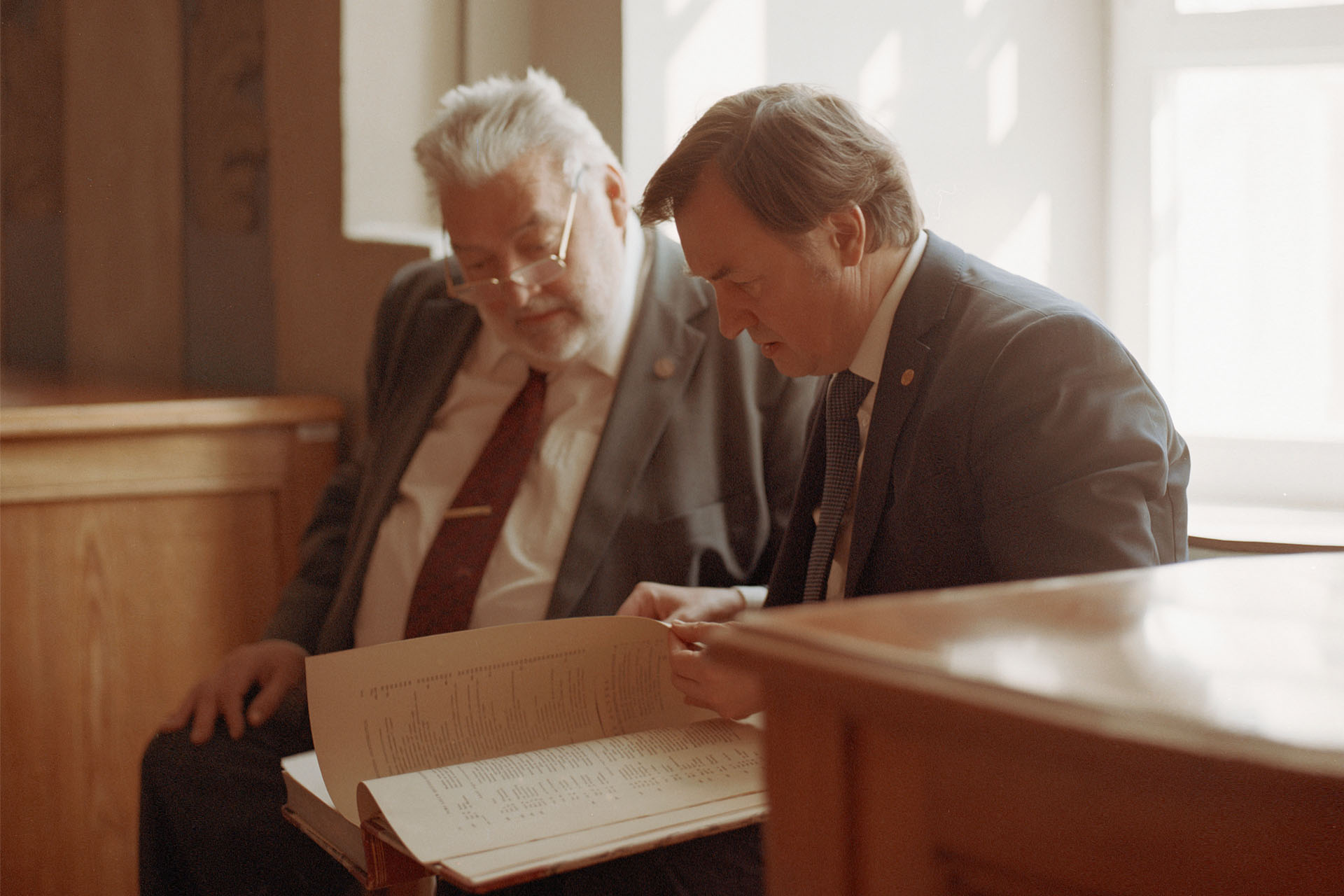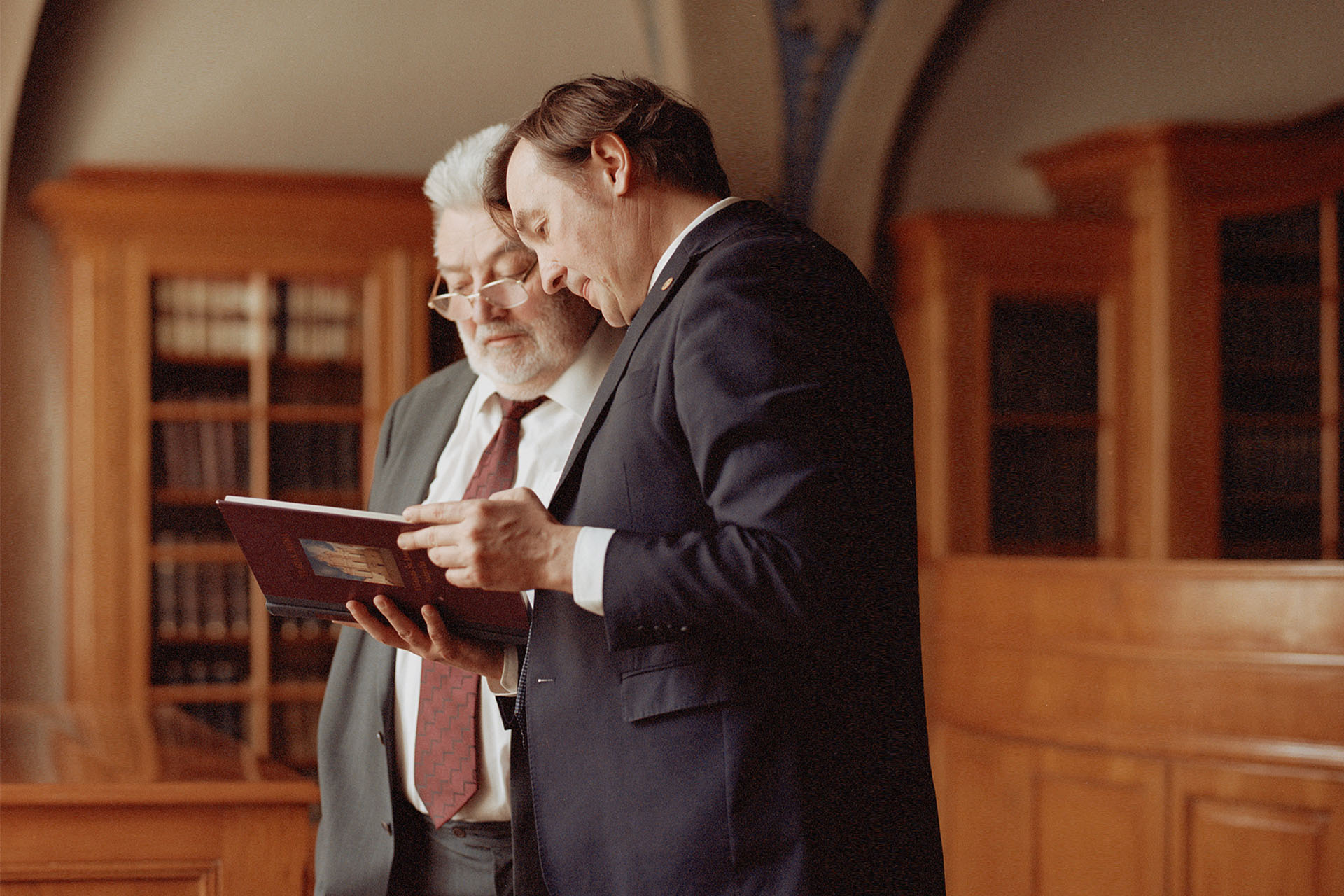Alfredas Bumblauskas: Even in 1994, I Knew Rimvydas Would Become the VU Rector
 “In 1994, when the Zenonas Ivinskis Readings took place, I knew that Rimvydas would one day be the rector,” said Prof. Alfredas Bumblauskas, remembering when the Rector of Vilnius University (VU), Prof. Rimvydas Petrauskas, was a fourth-year student. Once the professor recognised the talent of his student, he encouraged him to follow the path of science. Today, they are among the most recognisable faces in the Faculty of History at Vilnius University. During the interview, the professors discussed their teacher-student relationship and the University during the first years of independence.
“In 1994, when the Zenonas Ivinskis Readings took place, I knew that Rimvydas would one day be the rector,” said Prof. Alfredas Bumblauskas, remembering when the Rector of Vilnius University (VU), Prof. Rimvydas Petrauskas, was a fourth-year student. Once the professor recognised the talent of his student, he encouraged him to follow the path of science. Today, they are among the most recognisable faces in the Faculty of History at Vilnius University. During the interview, the professors discussed their teacher-student relationship and the University during the first years of independence.
We met with the VU Rector, R. Petrauskas, and his former lecturer, Prof. A. Bumblauskas, in a medieval office that looks more like a hall for nobility than an actual workspace. They said that the most important thing in developing a teacher-student relationship is face-to-face communication. We also felt a strong connection between the two men.
However, the VU Rector said that today’s students face an issue that commonly occurs at school – the fear of asking questions.
“I used to be like that. The feeling is particularly intense during interactions with students from Western countries. This problem still exists, even though I thought that Lithuanian students would change sooner. They still hesitate to ask questions and/or give a firm response, for fear of ‘asking it the wrong way’ or ‘what if I make a mistake,” Prof. R. Petrauskas revealed.
On 17 September 1993, the Department of Cultural Theory and History began its activities. The departments within the Faculty of History underwent reforms and other vigorous initiatives under the control of the Dean of the Faculty (1990-2002) A. Bumblauskas and his team, who essentially paved the way for the de-Sovietisation of the faculty and the meaningful renewal of the study process and the activities of the institution. It was a decade of particularly significant and revolutionary changes, some of the results of which are still apparent today.
“It was a period of metamorphosis and change between generations. They needed a dean and thought I was a good compromise. Back then, Prof. Irena Valikonytė kept asking me, but at first I tore up the application. When someone else asked, I tore it up again. Finally, Antanas Kulakauskas talked me into it. I thought to myself – if Antanas tells me to do it, I will. But I took on the role knowing very well the situation would be intense,” Prof. A. Bumblauskas recalled.
The professor does not consider himself to be a typical historian. In his own words, he has developed an undergraduate programme in Cultural History and Anthropology, where he is realising all his dreams. In the course, students examine the topics of the past and present, social and cultural history in terms of anthropology, socio-cultural history, memory and cultural studies.
A. Bumblauskas took office as VU Rector at the same time that the generation graduated during the first year of independence. R. Petrauskas is very proud of having the first diploma prepared in Lithuanian and the achievements of his Alma Mater.
“I realized very early on, during my first year of studies, that I wanted to be a scholar,” the VU Rector said.
“It was probably this quality that I noticed. He was very consistently immersing himself in academia,” the professor added.
“It was a kind of recognition that this path was the right choice. The Faculty of History was the perfect environment for me,” Prof. R. Petrauskas said.
However, Prof. A. Bumblauskas recalled that during the period when VU Rector R. Petrauskas joined Vilnius University, there was a lot of freedom: “I remember a student coming to us, fresh out of a conservatory, and saying, ‘I have completed an introduction to the guitar.’ The vice-deans and I looked at each other and went on reading his application.
Today, the situation is different. This is partly due to the Europeanisation of studies. Everything has to be harmonised – modules, credits and programmes – to ensure smooth international mobility,” said the VU Rector. According to him, although part of the freedom of that time has inevitably been lost, it certainly does not mean that one has to accept the current state of affairs.

“Those ‘wild’ times remain in our memory – but they will not come back. However, they must set an example. In a sense, I am always in favour of the greater individualisation of studies, so that students have more freedom to choose to follow parallel studies or other subjects. I have experienced that myself,” said Prof. R. Petrauskas.
The two most recognisable faces in the Department of History have remained the same – Professors Edvardas Gudavičius and A. Bumblauskas. They became winners of the Lithuanian National Culture and Art Prize in 1998 for their research on the show “Būtovės slėpiniai.” Their field of creative initiatives and ideas has included new works and ideas, as well as people who have become meaningfully involved in the activities of the department and its study areas.
Prof. E. Gudavičius was a very significant person in the teacher-student relationship between A. Bumblauskas and R. Petrauskas. According to the professors, they were united by E. Gudavičius’ particular approach to history. Both R. Petrauskas and A. Bumblauskas contributed to the book “Between History and Being: Studies for Prof. Edvardas Gudavičius’ 70th Anniversary” (Lith. “Tarp istorijos ir būtovės: studijos prof. Edvardo Gudavičiaus 70-ečiui”) to honour the teacher’s memory.
A. Bumblauskas once said in an interview that he met E. Gudavičius at the university back in 1978, and they never parted ways. Meeting him also partly influenced his decision not to drop out at that time. Meanwhile, Rector R. Petrauskas stated that “he was a teacher since year one”.
“In 1989, a series of E. Gudavičius’ articles were published. He was one of those people who knew how to convert his academic knowledge into a short, interesting text. This was really enticing. I think it partly contributed to my choice to study in the Faculty of History at Vilnius University in the 1990s. It’s the best decision I ever made,” the VU Rector said.
However, the relationship between E. Gudavičius and R. Petrauskas, as he explained, was academic and limited by space. The professor was seriously ill and could not walk; therefore, the lectures and consultations took place in his home, in a small apartment in Viršuliškės, where he also wrote one of the most open accounts of Lithuanian history, recalled Prof. R. Petrauskas.
“He also gave lectures without using any notes. He rarely looked at his students. Instead, he would tilt his head and speak while looking at the ceiling, so it seemed like he had all his notes written on the ceiling,” the VU Rector said.
As one of the oldest and most famous higher education institutions in Central and Eastern Europe, Vilnius University has had a profound impact not only on the cultural life of Lithuania, but also on that of neighboring countries, and has provided the world with many generations of scientists, poets and cultural figures. The many famous professors and students who attended the university include: German physicians Johann Frank and his son Joseph Frank; historian Joachim Lelewel; poets Adam Mickiewicz and Juliusz Słowacki; historian Simonas Daukantas; and the Nobel Prize-winning poet Czesław Miłosz.
The university also cherishes its long-standing traditions – just like today, many foreigners studied at VU in the past. In the context of current events, in response to Russia’s unprecedented military aggression against Ukraine, the VU departments have made a number of decisions in an effort to help the Ukrainian people. Once such a move is opening the doors of the university to Ukrainian researchers and students.

“I hope that the war in Ukraine will highlight the importance of our region. The Ukrainians will succeed. I used to think I must criticise Ukraine’s position following the Orange Revolution. They had the historical concept of cамодостаточность, or we can handle things on our own – which I believe is wrong. However, Ukraine has proven that they are a free frontier. Just like Poland and the Constitution of 3 May became a symbol of freedom for Europe, Ukraine’s situation will turn out to be something similar and our region will become a little more interesting,” Prof. A. Bumblauskas believes.
According to Prof. R. Petrauskas, the country will become not only more interesting, but also more understood. The VU Rector is convinced that as more people come to live in Lithuania for a longer period of time, they will gain a better understanding of this European region. However, the professor believes this will also require more programmes or courses at Vilnius University.
“Vilnius University is famous for its physics and biotechnology programmes, but we should not forget about social sciences and the humanities, because they can show everyone how important this region is, how relevant it is and how integral it is to Europe. Europe has many important, famous regions including the Apennines, the Pyrenees and Scandinavia. Over time, Baltic studies could become just as established as Scandinavian studies,” the VU Rector said.
To note the importance of developing a teacher-student relationship and having the courage to ask questions, VU is presenting an art project and a virtual exhibition, in collaboration with the documentary and portrait photographer Tadas Kazakevičius. The exhibition features a series of portraits of the VU Rector Prof. R. Petrauskas and Prof. Bumblauskas, revealing the sincere relationship between a teacher and his former student.